
Unclaimed Money Lookup - Vermont
Free Vermont Unclaimed Money Lookup
We receive referral fees from partners (advertising disclosure)
The information we provide you is free of charge and a result of extensive research by our home warranty experts. We use affiliate links on our site that provide us with referral commissions. While this fact may not influence the information we provide, it may affect the positioning of this information.
(advertising disclosure)
The information we provide you is free of charge and a result of extensive research by our home warranty experts. We use affiliate links on our site that provide us with referral commissions. While this fact may not influence the information we provide, it may affect the positioning of this information.

Vermont Unclaimed Money -
The Ultimate Guide 2026
- UPDATED February 2026
Learn the basics of finding unclaimed property in the Green Mountain State in our ultimate guide to unclaimed money in Vermont.
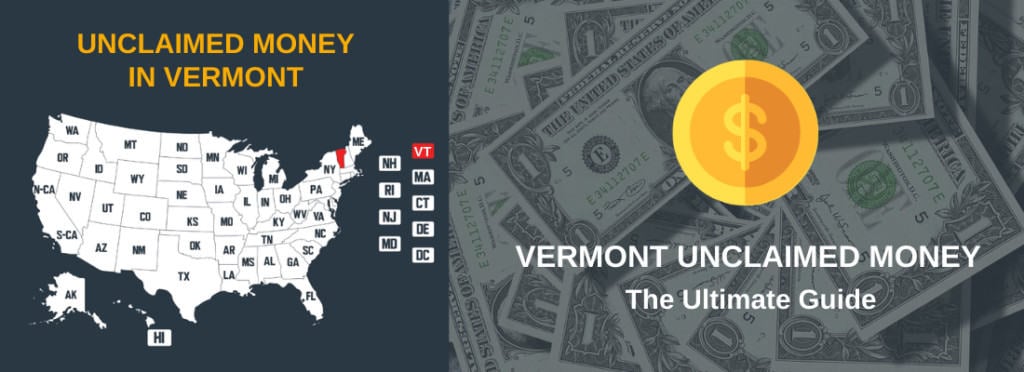
Contents
- Your Guide to Unclaimed Property in Vermont
- What is Unclaimed Money?
- How to Find Unclaimed Property in Vermont
- How to Claim Your Vermont Assets
- How Much Unclaimed Money is in Vermont?
- Is the Vermont Database the Only Place to Look for Unclaimed Property?
- How Long Does Vermont Take to Release Funds?
- Unclaimed Property Laws in Vermont
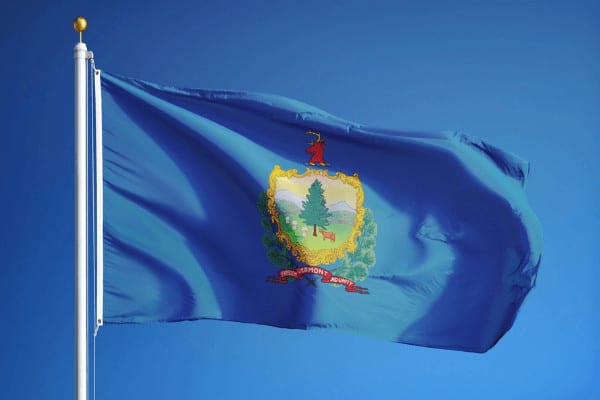
Your Guide to Unclaimed Property in Vermont
Also known as the Green Mountain State, Vermont is one of the nation’s smallest states. That might make you think that it doesn’t have as many unclaimed assets as other states do, but one search of the online system will show you that Vermont has tons of money that belongs to others. This can include a refund check from your college or old landlord as well as a bank account that you thought you closed. The best way to find the assets that you can claim is through the Vermont system.
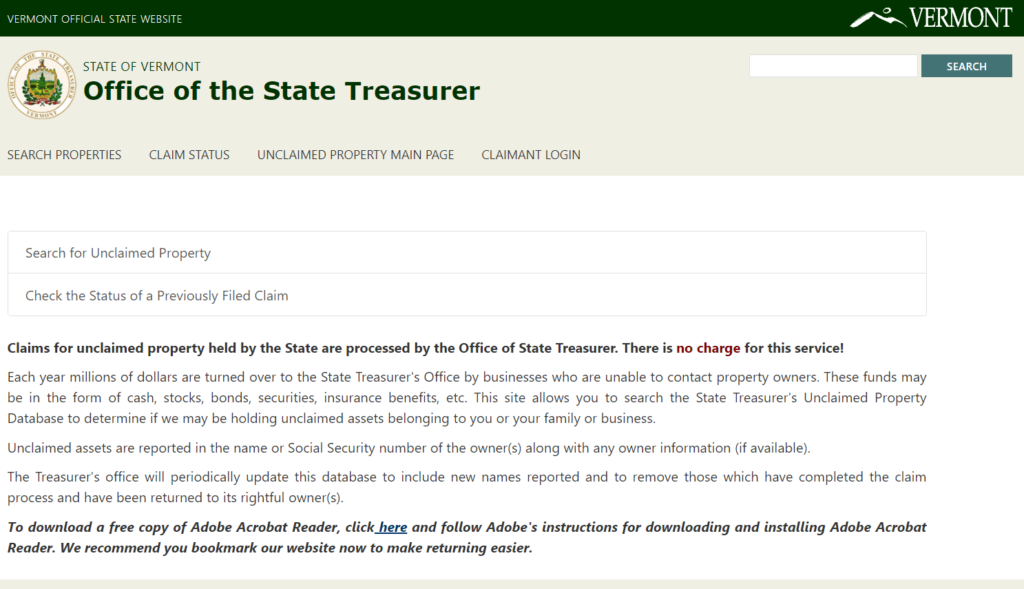
With nearly $100 million in unclaimed assets, the Vermont State Treasurer wants to help locals get their money. Once you claim your property and complete the process, the treasurer will send a check in your name for the total amount. You can search for assets held in your name along with those attached to your social security number. Vermont also offers help for those who want to find property owned by a deceased loved one and those owned by a business. Use our ultimate guide to unclaimed money in Vermont to see how you can find your property and claim your money.
What is Unclaimed Money?
You may hear people talk about unclaimed money and not know what it means. This doesn’t always refer to money such as cash. It refers to a type of asset in which a holder has possession of the asset for one or more owners. Both the owner and holder agree to remain in contact about the asset. When they lose touch and the holder cannot contact the owner through specific means, the asset becomes abandoned or dormant. Holders must contact the Vermont Treasurer and fill out forms that include the owner’s contact information. The treasurer then looks for the owner and adds the property to the Vermont database.
One example of unclaimed property is a security deposit. Vermont allows a landlord to charge you a security deposit equal to one month’s rent when you move into a new rental property. When you move out, state law requires that the landlord return the deposit to you within 14 days. The landlord can deduct cleaning costs and other expenses from your deposit but must show proof of those costs. Vermont helps you find security deposit checks from landlords as well as utility companies.
You’ll also find dormant bank accounts listed in the Vermont database. Though you may have a hard time imagining that someone would abandon a bank account, it can happen for many reasons such as opening a new account at a different bank or moving to a state where the bank has no locations.
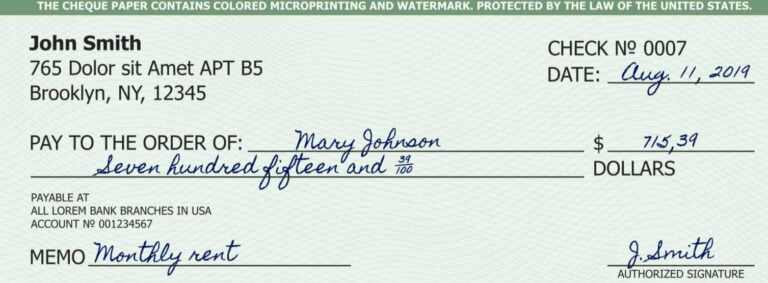
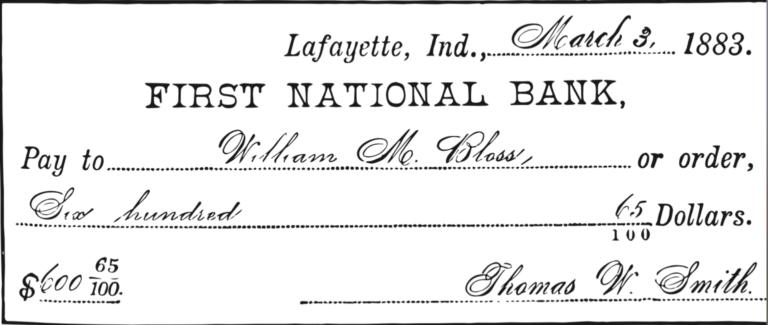
Even if you are a joint owner of a bank account, it can become dormant when none of the owners touch it for a year or longer. The bank will contact the treasurer and show that they tried to locate any of the owners. Vermont then takes over the account. You may even find an account worth more than you expected due to the interest that it earned.
Vermont also has unclaimed property owned by deceased people. Let’s say that a loved one passed away and you allowed someone in your family to handle their estate. To close an estate in the Green Mountain State, you need to go through probate. The judge will name an administrator or executor who is responsible for liquidating the estate and paying the deceased’s bills.
They will also follow the wishes of the deceased’s will to give property to others. You may find that the will gave some property to you or that the court named you the owner of other assets. If anyone you knew passed away, it’s worth checking the database for unclaimed probate assets.
In 2020 alone, the Unclaimed Property Division in Vermont helped more than 17,000 people get assets back with a value of nearly $5 million. You can become one of those lucky people when you work with the Vermont Treasurer and Unclaimed Property Division. We’ll show you how to use the website to find your money.

How to Find Unclaimed Property in Vermont
The State of Vermont Office of the State Treasurer gives you the chance to search for unclaimed assets that belong to anyone you can name. You just need to follow a few steps to find those assets.

Step 1: Visit the Vermont Unclaimed Property Division website, which the treasurer maintains. Click on the “Search for Unclaimed Property” to find your assets.

Step 2: Click on the small circle next to the “Person” label to search for personal property. You can also search for assets owned by a business or city.

Step 3: Type your last name in the box along with your first name and/or city if you want to use them. If you clicked the wrong box, the site allows you to go back and select a different one. You also need to use the CAPTCHA box before the site lets you continue.
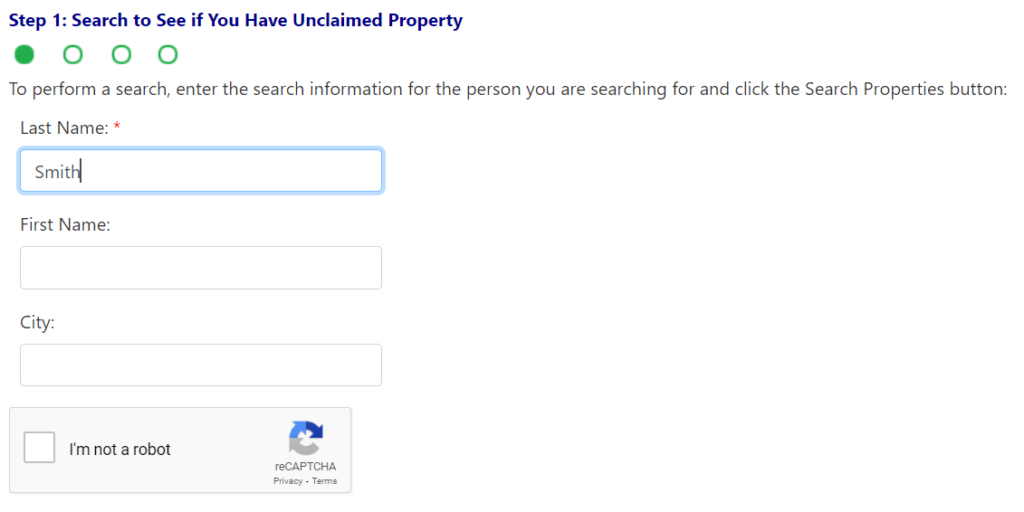
Step 4: View the information attached to each asset in the search results to see what you can claim. Vermont shows the full name of the owner and the joint owner if the asset has one. You also see the name of the asset’s holder and their address along with the owner’s last known address. If you look at the “Amount” column, you’ll see the value of the property listed in amounts such as less than $10 or more than $200.
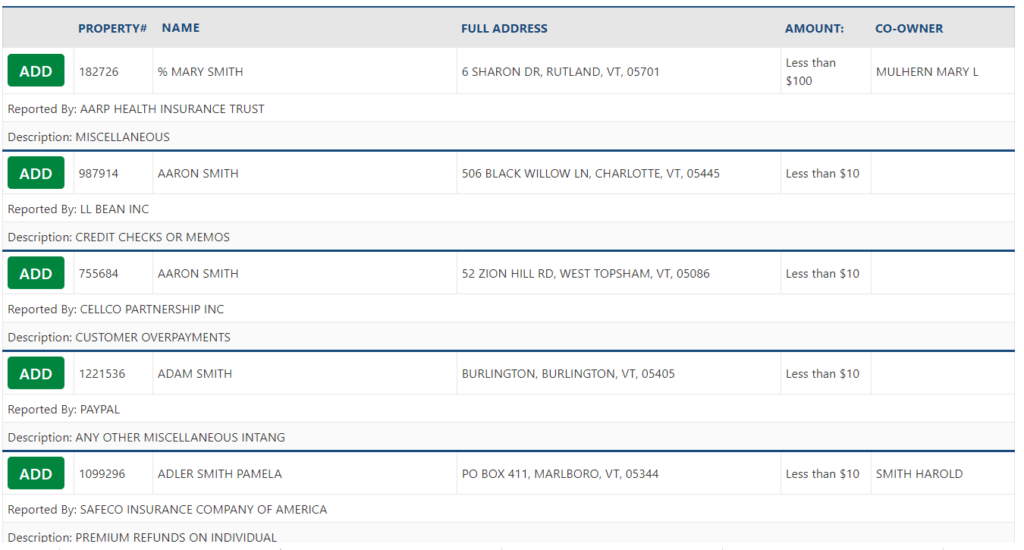
How to Claim Your Vermont Assets
Once you find your assets, you need to claim them. This process requires a few more steps.
Step 1: Look for the “Claim” button in bright green on the far left side of the page. Click on this button to add the property to your cart. You can click on all the assets that you want to claim before viewing your cart.

Step 2: View the property to make sure that you picked the right one. The “Relationship” button lets you state whether you are the owner or claiming the property for a different reason. If you plan to file multiple claims, you can tell the site to list the same relationship status on all of your forms.

Step 3: Choose how you want to file. Though you can proceed as a guest, the site also lets you log into your account or register for a new account. You must then enter your social security number and home address. Though Vermont lets you claim property if you no longer reside at the same address, your social security number must match the one on the asset. If you aren’t the owner, you need the owner’s social security number.
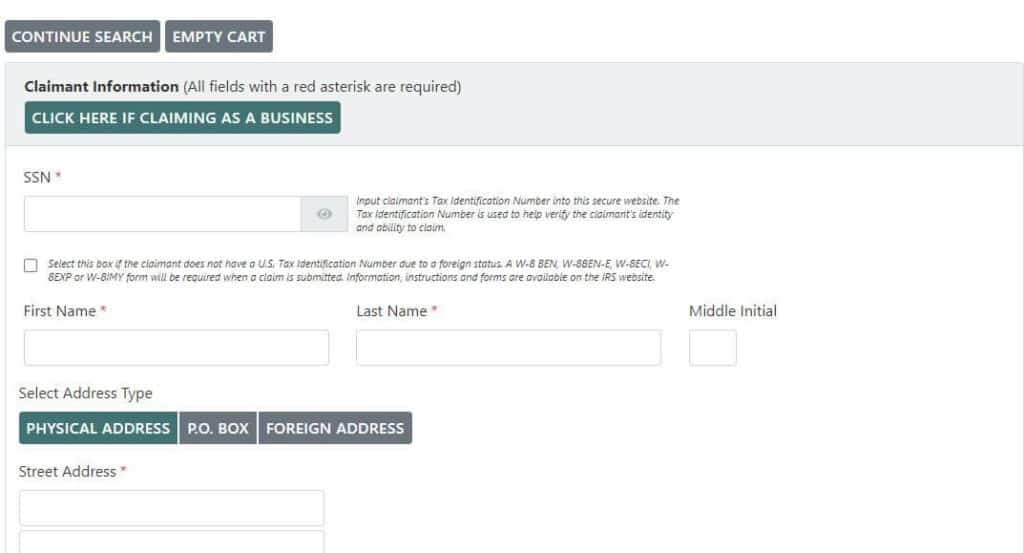
Step 4: Read through the box at the bottom of the page. This box states that filling with false information is perjury and subject to state laws. Once you click to show that you read this information, the site will send a copy of your form to your email address and send another to the treasurer.

How Much Unclaimed Money is in Vermont?
On top of the nearly $5 million that the Vermont Treasurer returned to owners, the Unclaimed Property Division has nearly $100 million in assets that you and others can claim. This comes out to more than 750,000 assets, which comes out to more than one claim for each resident of the state. Whether you live in Stowe, Burlington, Montpelier or any other city, you can work with the Unclaimed Property Division to claim unclaimed assets in Vermont.
Is the Vermont Database the Only Place to Look for Unclaimed Property?
If you only look for unclaimed property in Vermont, you might miss out on hundreds of dollars or more. There are tons of places where you can look for unclaimed money on the web. If you’re like most people, you probably didn’t spend your whole life living in the Green Mountain State. Missing Money can help you find lost property in other states as long as you search for one that partnered with the site. You may want to check with the treasurer in other states to see if they have other unclaimed property databases.
Many people use the web to find cash and other assets held in pension accounts such as stocks and bonds. The Pension Benefit Guaranty Corporation is the best place to start your search because it features information on accounts opened by millions of people who worked for companies across the country. You do not need a social security number to search, but the site asks for the number of the owner if you want to claim an account. The U.S. Railroad Retirement Board offers similar help if you need to find retirement accounts owned by railway workers, even if they are no longer with you.
There are other websites maintained by government organizations and others that can help you find unclaimed assets, including:
- Federal Deposit Insurance Corporation: With help from the FDIC, you can find a bank account that you lost during or after a bank closed before a state department obtains it. You can also use this site to see what state has your account and where you need to go to claim it.
- Department of Veterans Affairs: Millions of veterans and former soldiers purchased life insurance through the VA to support their families when they’re gone. If the VA finds a policy bought by someone you know, it can tell you who has the right to the funds and whether you can claim it.
- U.S. Federal Investments: Treasury bonds give young children money that they can use later in life such as funds to pay for college. You do not need to have the original bond in your hand to claim it as this site offers help for those who lost their bonds but want their money.
- Department of Housing and Urban Development (HUD): HUD can help you work out a deal with the bank before it takes back your home and get a mortgage that you can afford. Many people who worked with HUD in the past have unclaimed refund checks. You can use the HUD site to find your refund and learn about insurance refund scams.
- Internal Revenue Service (IRS): The IRS issues refunds to those who pay more in taxes than they owe. If you did not get a refund check from any previous returns, look for it online. You can claim the check and request that the IRS send it to your new address or deposit it in your bank account.
- National Credit Union Administration: Though credit unions can shut down, they must return the money that owners held with them. The NCUA allows you to search for your old accounts and see if they still exist. You may find that your money is available in the form of a check held by the treasurer in a different state.
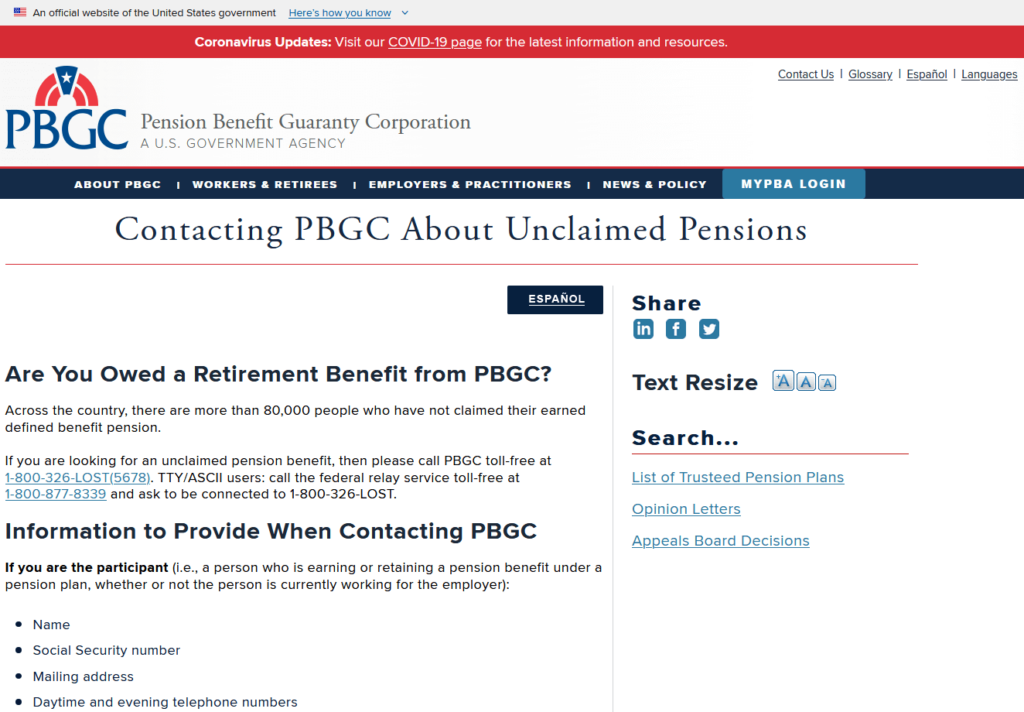
How Long Does Vermont Take to Release Funds?
The biggest question that you might have on your mind before claiming property in Vermont is how long the process takes. As long as the treasurer verifies your identity as the owner, the process can take as little as six weeks. If you file for a deceased’s property or need to submit more information, the process can take up to eight weeks or longer. Vermont has a status checker that lets you view your claim during each step in the process. You need both the ID number and zip code associated with the claim. If you have an account with the site, you can log in and view all of your claims in a list.
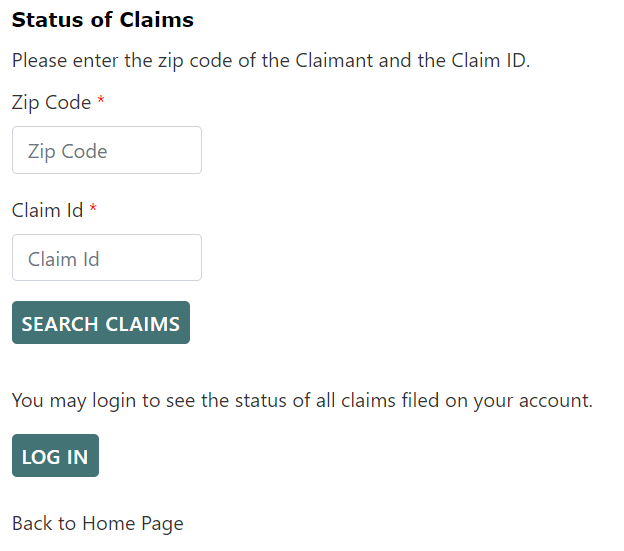
Unclaimed Property Laws in Vermont
Title 27 and Chapter 14 of the state laws in Vermont cover everything that you need to know about the Green Mountain State’s unclaimed property laws. When you check out these laws online, you’ll see how long you have to claim different types of property and what holders can do before returning your property. You may want to check out how the appeal process works, too. If you claim an asset that the holder refuses to return, you can appeal their decision. This helps you get the asset back before it goes to the Vermont Treasurer.
Vermont Unclaimed Money FAQs
What Happens to Abandoned Safe Deposit Boxes in Vermont?
Vermont is one of the only states in the nation that will not sell abandoned safe deposit boxes. State law requires that banks and other holders have a signed agreement with the owner who rents the box. The holder is responsible for keeping the box safe for a minimum of five years after either their last contact with the owner or the owner’s last rental payment. Vermont allows holders to throw away paperwork and documents along with other contents that have no monetary value. The rest of the contents of the box will go to the Vermont Treasurer and stored in a vault. Though you should see your property listed in the database, Vermont may require that you pay any fees due to the holder before you will get the contents back.
Who Does Vermont Let Claim Property?
Though you’ll likely file a claim because you are the owner of abandoned property, Vermont allows you to file for select other reasons. The most common is as a personal or legal representative. A legal representative is someone who has the legal right to act on behalf of a client such as an estate or probate lawyer. Power of attorney paperwork also qualifies you as a legal representative. A personal representative is someone who can act on behalf of another individual such as an estate administrator. In cases involving life insurance policies and certain accounts, you can file if you are the designated beneficiary. Vermont also lets you file as a direct heir of a deceased’s owner.

What Does Vermont Do with Unclaimed Assets?
Vermont holds unclaimed assets as a way to help both reported owners and holders. Holders located across the state have limited resources and may not have the time or space necessary to hold property that belongs to others. State law requires that they document their attempts to find the owners and that they only contact the treasurer if their attempts fail. They also need to hold the property for a minimum of one year. This gives the owner time to find and claim the asset. In the case of heirs, it gives them time to settle the deceased’s estate before looking for unclaimed property. Vermont has no limit as to how long it will hold the property for an owner.
How Can You Avoid Common Scams?
As you look for unclaimed assets in Vermont, you may come across some scams that you should avoid. This includes websites that promise they can find you money as long as you pay an upfront fee. Other sites let you search for missing money and then ask that you pay before you can view the information. You should also avoid companies that ask you to sign a nondisclosure agreement. This prevents you from talking about your experience with their services and may even claim that the company can sue you if you talk about them. You never need to pay a fee to find unclaimed property in the Green Mountain State.
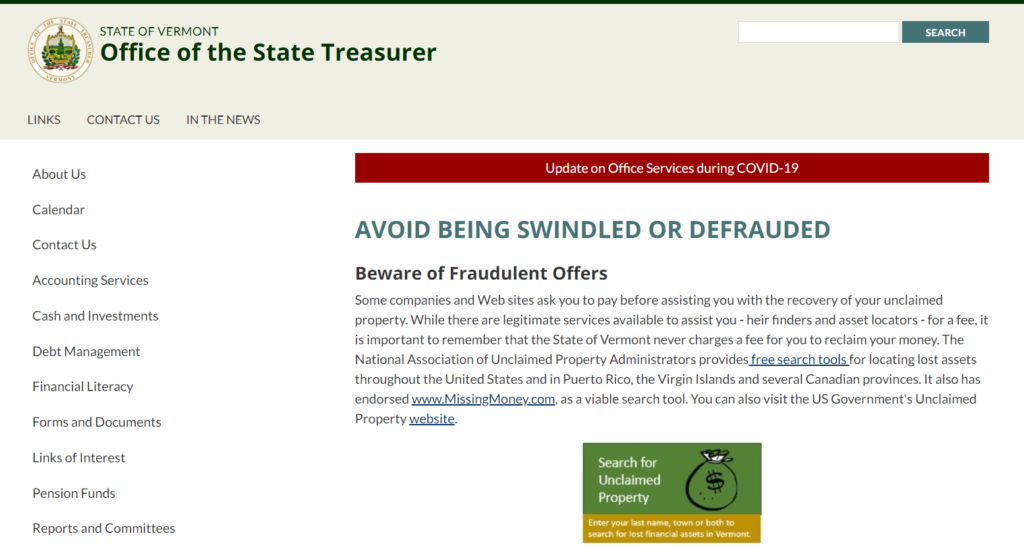
Should You Hire a Vermont Asset Finder?
Asset finders go by a few different names, including heir locator or money finder. They agree to find the money that belongs to you in exchange for a fee. Not only will they claim that they can find the property that you own, but they also claim that they’ll find a property you can claim as an heir. Vermont requires that finders charge a maximum fee of 10% of what you get from the state. If you have a $1,000 bank account, the maximum that a finder can charge is $100. Finders cannot legally charge you until they obtain your property and get it back to you. As the Vermont database is free to use, you’ll usually find that an asset finder cannot do anything that you can’t do on your own.
Can You Prevent Property and Assets from Becoming Abandoned?
The main reason why assets become abandoned in Vermont is that the owners forget about them. It can take as little as one year for the holder to decide that you abandoned it. You should make attempts to get in touch with your holders and access your accounts every six to eight months to make sure that they don’t become dormant. Before you move, notify anyone who holds an account for you, even if you only plan to move a few blocks away. We also recommend writing down any refunds or checks coming to you and cash them as soon as they arrive. The longer that you ignore the checks, the greater the risk is that they will expire before you get them to the bank.

Conclusion
Those who live in the Green Mountain State have two simple ways to find unclaimed assets. We recommend using the database available from the Vermont Treasurer and Unclaimed Property Division. This site is easy to use and lets you check on the status of any claim that you file. You can also use Missing Money to see if Vermont and other states have money in your name. Our ultimate guide to unclaimed money in Vermont shows you just how easily you can find all of your money and what you can do to get your assets back.
Quickly Search For Unclaimed Money
Disclaimer: OurPublicRecords mission is to give people easy and affordable access to public record information, but OurPublicRecords does not provide private investigator services or consumer reports, and is not a consumer reporting agency per the Fair Credit Reporting Act. You may not use our site or service or the information provided to make decisions about employment, admission, consumer credit, insurance, tenant screening, or any other purpose that would require FCRA compliance.